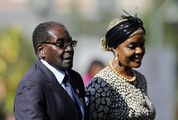Source:

BUSINESS DAY TV: Gold producers concerned about possible Amcu strike
by Transcript services,
2015-11-09 10:27:05.0
ELIZE Strydom, chief negotiator at the Chamber of Mines, talks us through the gold producers’ wage settlement
BUSINESS DAY TV: AngloGold Ashanti and Harmony Gold have finally struck a wage deal with trade unions NUM (National Union of Mineworkers), Uasa (United Association of SA) and Solidarity, although not Amcu (Mineworkers and Construction Union), and in doing so they’ve broken ranks with Sibanye Gold whose offer to its workers was conditional on all four unions accepting the wage deal.
But with Amcu threatening a strike, where does this leave the gold sector? Joining us now on the line is chief negotiator at the Chamber of Mines Elize Strydom.
Elize...you must be, I suppose, fairly relieved, but what was the sticking point with Amcu, why have they not signed what was agreed to by the other three unions on Friday?
ELIZE STRYDOM: Amcu has simply not moved in the three and a half months that we have been negotiating, they’ve simply not moved so they’re still sticking to their initial demand for R12,500.
BDTV: Okay, and yet they say they’re consulting with members at the moment. Has any timeframe been given for those consultations, and what next...is it simply the next step being strike action?
ES: I’m aware of the fact that Amcu have asked permission from the mining companies, particularly Sibanye to have these mass meetings so they will take that in the course of this week. The way forward in the case of AngloGold Ashanti and Harmony the wage agreement will be extended to Amcu and its members because the NUM, Uasa and Solidarity constitute the majority of the employees in those two companies and that Amcu members cannot participate in (a) protected strike in those two companies.
BDTV: So just to clarify there, what representation does Amcu have at Sibanye’s mines, are they the dominant union there?
ES: No they’re not. They represent 42% of the employees in the workplace whereas the NUM actually represents 43% of the employees in the workplace. And if you take the NUM, Uasa, and Solidarity collectively, they represent 49% of the employees. But to be able to extend an agreement to the minority you collectively have to represent 50+1% of the employees in the workplace and that the three unions can’t do.
BDTV: Okay, so that’s the holdup for Sibanye because obviously I imagine they would have liked to have extended that wage agreement with the other three unions.
ES: Very much so because then it means that even Amcu, and the fact that it has not signed the agreement is irrelevant and they will be bound by the agreement and they can’t participate in protected strike action.
BDTV: Just how much a risk of destabilisation does this bring to the industry in your view, right now?
ES: I’m very concerned. We’re monitoring the situation very closely. There is a possibility for those unions and their members that want to sign the agreement are becoming anxious and very frustrated, and it might very easily turn into violence, particularly between the NUM and the Amcu members. So we’re very concerned but we’re monitoring the issue and we’re trying to be responsible employers.
BDTV: Talk us through the increases...so they range from 6% for miners, artisans and officials to 10.4% for so-called category-4 employees, so what is the average wage that mineworkers are earning now from, I suppose, the bottom of the pay scale to the top?
ES: If we look at what we would call an entry level employee or category-4 employee, they currently earn R5,700 basic wage. Then you need to add all the other allowances and fixed pay aspects, and then on top of that you need to add the variable pay, the bonuses, the overtime, etcetera, and on average a category-4 employee in gold would be earning easily about R12,000 – R15,000...
BDTV: Okay so that’s some of the figures we’re looking at. Has industry made any inroads in communicating the stability agenda, what’s your sense of the mind-sets held by the negotiating parties, both labour and mining companies right now, because that trust deficit still seems to be quite apparent?
ES: We have tried so hard since we commenced the negotiations on 22 June, to communicate the financial realities, economic realities to the trade unions. We as companies opened our books, invited financial experts from the unions to engage with our financial experts to explain the realities, etcetera. But unfortunately these matters.
BDTV: So if you had to point any fingers, would you say the unions didn’t come to the party as far as trying to get over the distrust barrier that they’ve had with employers over the past few years?
ES: No I would say in fairness to particularly the NUM...that they were prepared to move to and agreed to these wage increases of R600 per month for now over a three year period for Harmony. And in the case with AngloGold Ashanti to R750 in year one, etcetera. But the argument for ... has to attract benefits. The previous offer we made was R1,000 but not attracting benefits and the unions came back and said we would rather look at a lower basic wage increase but it should attract benefits...in other words the employers’ contribution to retirement funds, etcetera, should also increase...that showed great maturity.
BDTV: On that note, let’s leave it there.
ELIZE Strydom, chief negotiator at the Chamber of Mines, talks us through the gold producers’ wage settlement
BUSINESS DAY TV: AngloGold Ashanti and Harmony Gold have finally struck a wage deal with trade unions NUM (National Union of Mineworkers), Uasa (United Association of SA) and Solidarity, although not Amcu (Mineworkers and Construction Union), and in doing so they’ve broken ranks with Sibanye Gold whose offer to its workers was conditional on all four unions accepting the wage deal.
But with Amcu threatening a strike, where does this leave the gold sector? Joining us now on the line is chief negotiator at the Chamber of Mines Elize Strydom.
Elize...you must be, I suppose, fairly relieved, but what was the sticking point with Amcu, why have they not signed what was agreed to by the other three unions on Friday?
ELIZE STRYDOM: Amcu has simply not moved in the three and a half months that we have been negotiating, they’ve simply not moved so they’re still sticking to their initial demand for R12,500.
BDTV: Okay, and yet they say they’re consulting with members at the moment. Has any timeframe been given for those consultations, and what next...is it simply the next step being strike action?
ES: I’m aware of the fact that Amcu have asked permission from the mining companies, particularly Sibanye to have these mass meetings so they will take that in the course of this week. The way forward in the case of AngloGold Ashanti and Harmony the wage agreement will be extended to Amcu and its members because the NUM, Uasa and Solidarity constitute the majority of the employees in those two companies and that Amcu members cannot participate in (a) protected strike in those two companies.
BDTV: So just to clarify there, what representation does Amcu have at Sibanye’s mines, are they the dominant union there?
ES: No they’re not. They represent 42% of the employees in the workplace whereas the NUM actually represents 43% of the employees in the workplace. And if you take the NUM, Uasa, and Solidarity collectively, they represent 49% of the employees. But to be able to extend an agreement to the minority you collectively have to represent 50+1% of the employees in the workplace and that the three unions can’t do.
BDTV: Okay, so that’s the holdup for Sibanye because obviously I imagine they would have liked to have extended that wage agreement with the other three unions.
ES: Very much so because then it means that even Amcu, and the fact that it has not signed the agreement is irrelevant and they will be bound by the agreement and they can’t participate in protected strike action.
BDTV: Just how much a risk of destabilisation does this bring to the industry in your view, right now?
ES: I’m very concerned. We’re monitoring the situation very closely. There is a possibility for those unions and their members that want to sign the agreement are becoming anxious and very frustrated, and it might very easily turn into violence, particularly between the NUM and the Amcu members. So we’re very concerned but we’re monitoring the issue and we’re trying to be responsible employers.
BDTV: Talk us through the increases...so they range from 6% for miners, artisans and officials to 10.4% for so-called category-4 employees, so what is the average wage that mineworkers are earning now from, I suppose, the bottom of the pay scale to the top?
ES: If we look at what we would call an entry level employee or category-4 employee, they currently earn R5,700 basic wage. Then you need to add all the other allowances and fixed pay aspects, and then on top of that you need to add the variable pay, the bonuses, the overtime, etcetera, and on average a category-4 employee in gold would be earning easily about R12,000 – R15,000...
BDTV: Okay so that’s some of the figures we’re looking at. Has industry made any inroads in communicating the stability agenda, what’s your sense of the mind-sets held by the negotiating parties, both labour and mining companies right now, because that trust deficit still seems to be quite apparent?
ES: We have tried so hard since we commenced the negotiations on 22 June, to communicate the financial realities, economic realities to the trade unions. We as companies opened our books, invited financial experts from the unions to engage with our financial experts to explain the realities, etcetera. But unfortunately these matters.
BDTV: So if you had to point any fingers, would you say the unions didn’t come to the party as far as trying to get over the distrust barrier that they’ve had with employers over the past few years?
ES: No I would say in fairness to particularly the NUM...that they were prepared to move to and agreed to these wage increases of R600 per month for now over a three year period for Harmony. And in the case with AngloGold Ashanti to R750 in year one, etcetera. But the argument for ... has to attract benefits. The previous offer we made was R1,000 but not attracting benefits and the unions came back and said we would rather look at a lower basic wage increase but it should attract benefits...in other words the employers’ contribution to retirement funds, etcetera, should also increase...that showed great maturity.
BDTV: On that note, let’s leave it there.





















Login OR Join up TO COMMENT